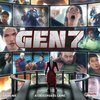 Gen7
Gen7
Author: Steve Nix
Publisher: Plaid Hat Games
Format: Board Game
Price: $100
Release Date: Dec. 13, 2018
Officer Calvin had been having a hard time of it in space. She'd just been woken out of cryosleep, having barely a day to wake herself before rushing to the robotics barracks aboard the giant civilization-carrying ship. It'd been years, decades even since a real problem has appeared. While Dr. Calvin and her fellow officers might not ever see anything besides the void of space, at least they had been working hard knowing the human race would prosper under their dutiful work.
Now however, things were different. There was a dead crew member in the warehouse, and no one knew why. The captain's meeting was supposed to be a simple briefing, a routine check on what should have been a small bug in the computer systems. It wasn't. All the officers scrambled to fire up manufacturing facilities, creating backup circuits to replace a network of mistakes that had somehow gone without notice before now. Officer Kale was furiously making medication for the new flu strain that was spreading through the passengers, but the health issues just didn't seem to want to be contained. It had all been going so well for so many generations! She put her head in her hands, watching her robotic attendants repair outer hull damage from the safety of her quarters. How was it all going so wrong now?
A bright red light flared to life on her console, and the robotics expert quickly covered it with her hand, making sure no one else saw. They had all been trying to keep quiet about all the issues until they were back in control as a way to avoid spreading panic. This should be easy, this should be easily contained. Still, she knew what the red light meant: another crisis had been found. Officer Kobayashi was calling her to the bridge, and there was probably no time to lose.
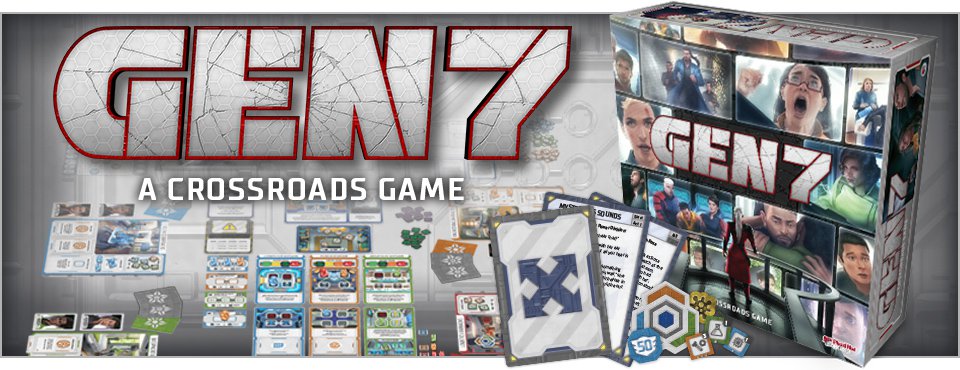
A small disclaimer: Gen7 Is a story based boardgame. While we hope to be vague in this article about specific events, there will be minor spoilers as we talk about our playthrough the first 'episode' of this game. We'll warn you later in the article as we get into more details about our experience. If you just want our thoughts and opinions on the game, skip to the section "Some Notes For The Captian's Log" and read from there.
Gen7 has been anticipated for a very long time. Back when Dead of Winter first appeared, the zombie survival game said right on it’s cover that it was “a crossroads game”. No one knew what that meant until the first few playthroughs, at which point players became very familiar with something known as the crossroads deck: a stack of cards filled with story anecdotes and terrible choices. On each of your turns, the player to your right would gleefully pull a card from the deck to see if it ‘triggered’ based on the current board state. If it did, you often found yourself stuck with a choice that felt more at home in an RPG like Mass Effect than a board game.
Players loved it. The sense of intensity Dead Of Winter had was praised by the community. The crossroads deck was heralded as a fantastic new design idea, and one that should absolutely be put into more games in the future. Plaid Hat Games put forward a community poll to ask where the next crossroads style game should take place. Space was chosen, and fans cheered!
Four years went by.
When I stumbled across the news that Gen7 existed, and that demonstrations were going to happen at PAX Unplugged, it brought an immediate surge of excitement. How had I forgotten about the possibility of this spiritual sequel? Could it actually live up to the daunting reputation of Dead of Winter? Had too much time gone by, and had the craziness about crossroads cards past?
There was only one way to find out.
It'll Take The Best Mentats To Survive This Voyage!
I was fortunate enough to find myself in contact with Steve Nix, Gen7’s designer, a few weeks before PAX Unplugged. I was also somehow able to stay rational enough to cohesively request a chance to play the game at the convention. To my surprise, I not only got the thumbs up, but was told to bring four good friends along. This wasn’t going to be just a demonstration, but a full play through of the first episode.
Episode? Yes, episode. While Dead of Winter played at the idea that many of its stories and various scenario choices were connected, Gen7 goes all in to become a campaign game. Indeed, to get the full experience of this space-faring adventure, you have to play seven full games, each one linking to the next. While Gen7 isn’t a legacy game – you never tear up components or permenantly mark the standard components – it’s meant to try and convey a story that has depth and gravitas, where your choices matter and carry over.
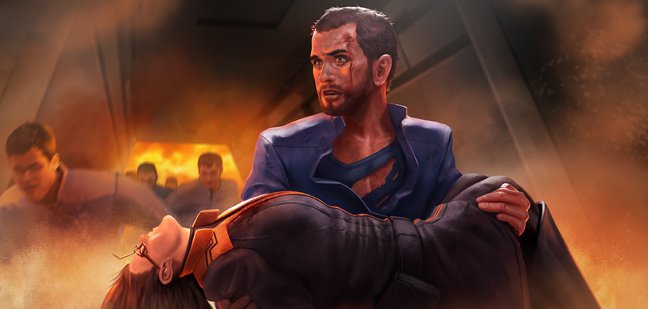
Much of the game comes with evocative art to go with the familiar crossroads storytelling.
Gen7 does this with a very large spiral-bound storybook. As you play through an episode, choices will come up as part of the chief story. You and the other players, each playing an officer aboard the ship, will have to vote on what the right way is forward. Based on what you choose, what you fail at, what you manage to accomplish, outcomes will change where the story goes. Decisions you make in episode 1 might make it easier to solve a problem in game 4. Some small mishap in game 2 could have disastrous consequences for your overall fate. It’s hard to tell just how much impact this will have without playing through a full run, but the idea was fascinating enough to hook me.
Turns out it’s more than enough to hook many other people too. When I brought up I was going to have a chance to play Gen7, I had more than a few people rush me for spots. Naturally, I had to bring along my writers Eric and Adam: Dead of Winter had been one of the first games we really bonded over and reviewed as a group. My friend Antonella was an easy choice, as she’s been fun to game with for years… not to mention her flare for the dramatic.
The last addition was Theo from the GeekyGaymerGuy channel. We had been in touch for a while, trying to find a good co-op game to play together when we met at the convention. It just seemed like fate.
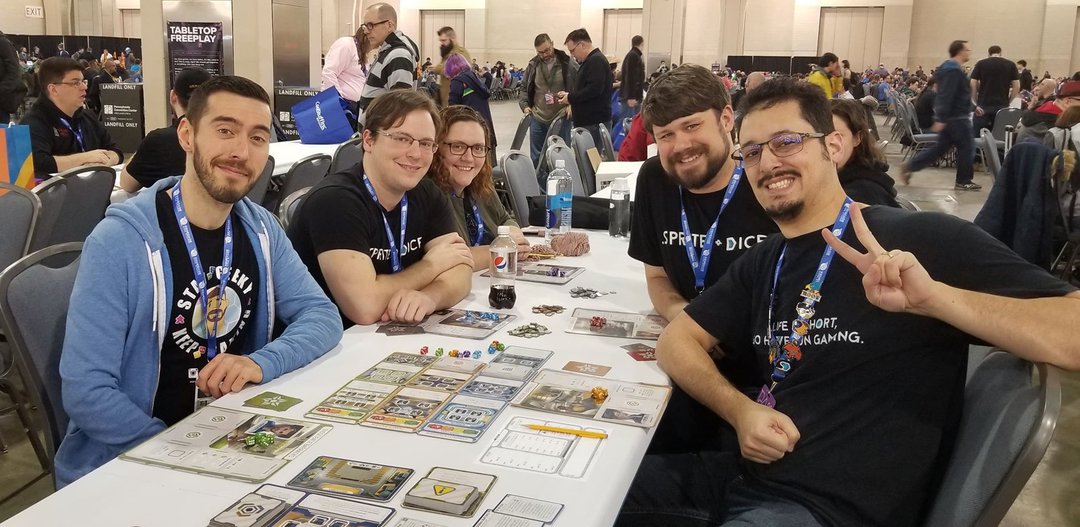
From left to right: Officer Kale of Bioscience, Officer Farnsworth of Science, Dr. Calvin of Robotics, Officer Kobayashi of Logistics, and Lt. "Scruffy" Smith of Engineering. This picture was taken before the bad things started.
Friday afternoon, we met, eagerly anticipating what was to come. Would this game live up to our expectations? Would we die horribly in the vacuum of space, dooming humanity?
At this point, I should probably mention we named our ship The Maru.
The Basics Of Saving Humanity
Gen7 will feel familiar for anyone who's played a game of Dead of Winter, while actually feeling a little less intimidating when you start that first episode. The story goes that you've all just woken up from your cryosleep hibernation in order to fulfill your next shift. There's been a small problem that's been logged that you have to deal with, but there's no earth-shattering crisis as you play the first round. It's actually a really smart design move: the first episode was 4 rounds long, with the first round essentially getting to be a tutorial without ever using that word. Don't worry: by the end of the episode, the stakes were sufficiently raised to become dangerous and compelling.
This specific section is dedicated to the basics of gameplay. Warning: some small details about the first episode's outline are given in these next few sections.
Each player is given a barracks to start the game, which is essentially their character card. It's what holds their individual supply of resources, the schema they acquire (researchable bonuses you can get from the manufacturing center), and the action dice you use like in Dead of Winter. You might notice that there aren't just D6s anymore, and it's one of the design changes for Gen7's storytelling: the D8 die of your color represents you as an officer. It gives each player a bigger sense of investment and agency, as they decide where their 'main character' ends up going on the ship during each round. The officer dice have the weight of being able to roll higher than most others, but there's also a little risk involved too. You see, using your officer means pulling a crossroads card, and now that the deck is a lot more condensed, that means the action is about to pick up. We'll get to crossroads cards in the next section though, don't worry.
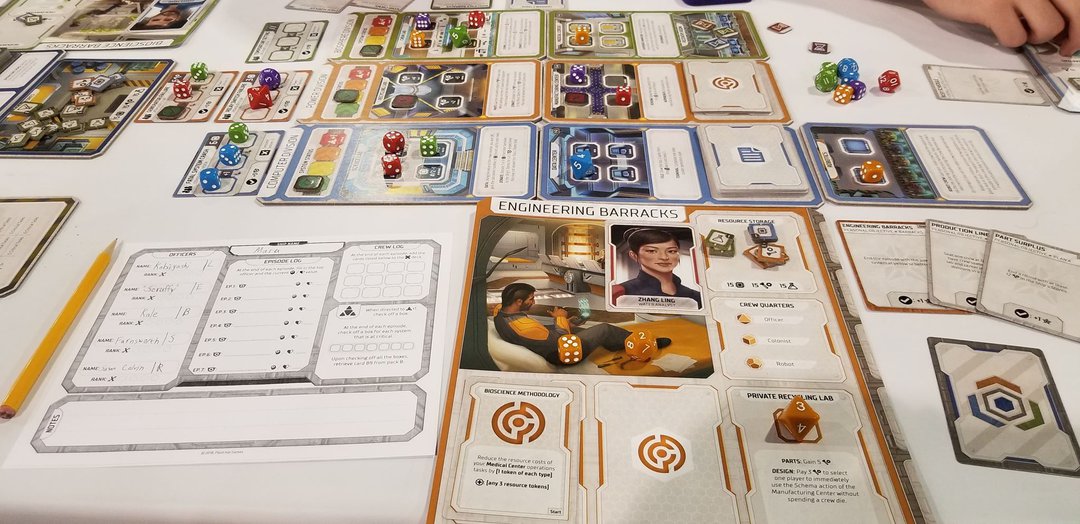
The view from Lt. "Scruffy" Smith's player area. You can see his special barracks ability in the bottom right, as well as a schema he has to make his bioscience actions stronger.
Each player is also dealt a character card which has no effect besides representing someone who works as an ensign or expert for your barracks. While our game didn't really use these at all, we did notice that it could trigger crossroads cards in the future: we just seemed to get lucky (or unlucky). Your barracks do have a specialization as well, which you can see in the picture above. For engineering, it means having a personal lab that's far more effective in making parts than the standard location at the table. For myself as logistics, it meant I could hold extra schema improvements, letting me specialize however I saw fit. There's a lot of character in Gen7 even before you start your first turn.
Our first round was easy, as I've said before: the logbook said we just had to survive round one, and a round is completed by having each player use their dice one at a time, going in a circle. While we had no additional objective during this time, we did have problems to fix. As dictacted by the storybook, a certain number of random crisis cards are dealt face up at the start which need to be dealt with. These are (relatively) small problems, like a generator failing, or a computer system having to be debugged... but if they aren't resolved by the end of the round, they will cause actual damage to the computer (blue), power (orange), or biosphere (green) divisions on the ship. Damage means you lose action slots in these zones, which naturally makes it harder to get things done. Take enough damage to go into the red on one of these systems however, and you've done core damage that lasts the entire campaign. We're very sure that's bad.
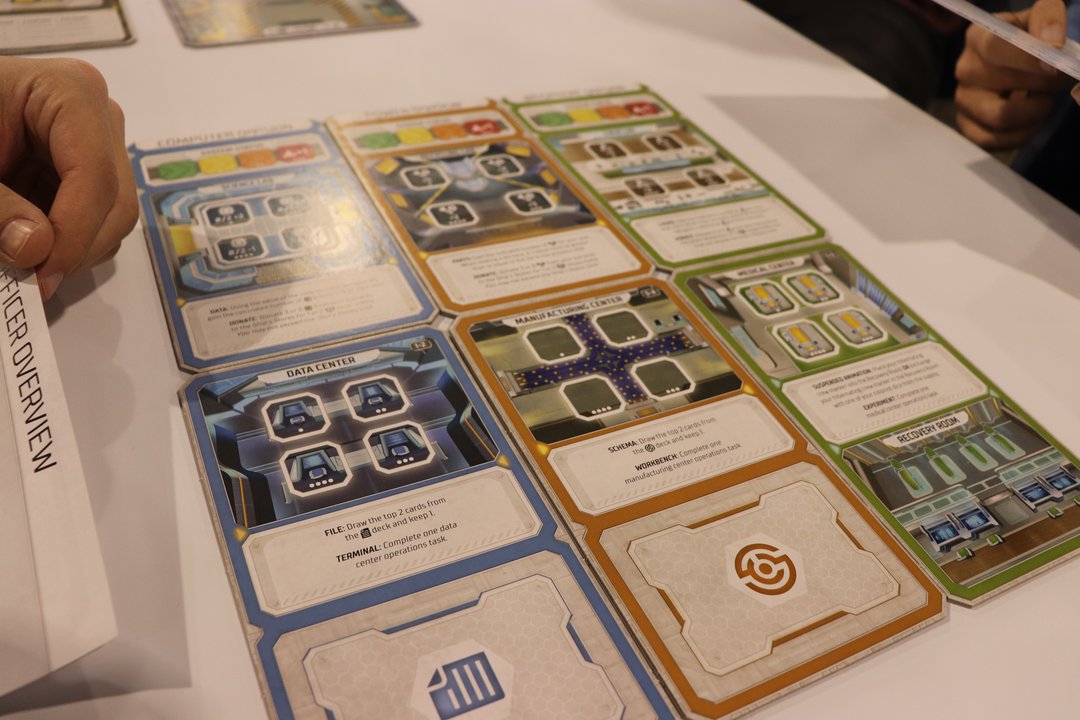
It's important to note here that there's no betrayer mechanic in Gen7, so you don't have to worry about one of your fellow officers trying to wreck all of your plans. This is a game about collaboration; which you'll desperately need. Unlike Dead of Winter, these standard problems need you to assign dice to them alongside resources, and it needs for you to do it in a particular way. To administer a vaccine in time for example, you might need to assign three six-sided dice to the problem... and each of them have to be the same number. Another issue might require one die that's under three and another that's five or higher. Low numbers aren't always bad, which is a fantastic design choice, and we'd spend a lot of time at the table deciding who rolled what and planning out our turns as best we could.
There are things to do that are not directly crisis related of course. Going to one of the three divisions lets you create supplies (computer chips, spare parts, medication) based on your dice roll and in what order you've placed your die in that division itself. You can donate some of these to the group supply so anyone can use them for crisis completion on their turn, but having your own supply is also important. Dice can be placed in the Data Center to get new file cards, which can be important one-time boosts. The Manufacturing Center lets you draw schema to upgrade your barracks, and the Medical Center allows you to pull other crew members out of cryosleep; essentially, you give up dice to get more in future rounds. Finally there is the robotics center, where you can place crew members to temporarily activate a robot. They are represented by 12-sided dice, and so doing this gives you a chance to roll really high numbers for placement. You can even 'split' a robot die into multiple numbers for a crisis. Roll a 9? You can put that on a card that requires a 4 and 5 to succeed, saving yourself energy.
This covers most of the basics of how to play Gen7, which we know is a lot. There's a reason why our game took over two hours, as we tried to learn how to play with five people.
Officer Kobayashi To The Bridge
When I asked Steve Nix what his main goal with Gen7 was, I got a lengthy but well thought out answer:
My focus for Gen7 was to create a compelling, layered narrative, driven by each specific play group's interests. The crossroads cards are the product line's signature, but in Gen7's case they are just one narrative layer, adding to the plot book's branching story paths and the players' own voiced banter that expands upon the breadcrumb hints within the story. Gen7's mechanics were also designed specifically to evolve as the story's plot unfolds and tension heightens over the campaign's seven episodes, so it blends game and story more smoothly than the vignettes of Dead of Winter.
I'm happy to say that after we survived the first round and had solved our first problems as a team, Steve's hopes for this game were proven to be sound. The second round began with a reading of the logbook again; as of yet, the massive problems we were all anticipating hadn't yet hit. That doesn't mean this round was problem-free, as we were given a very specific goal. Each of our officers had to be placed in the operations room by the end of the round, with the idea that we were gathering for an important meeting. If we didn't... well, we didn't know what would happen. The logbook just would get turned to a different page that we were all pretty sure would spell bad news.
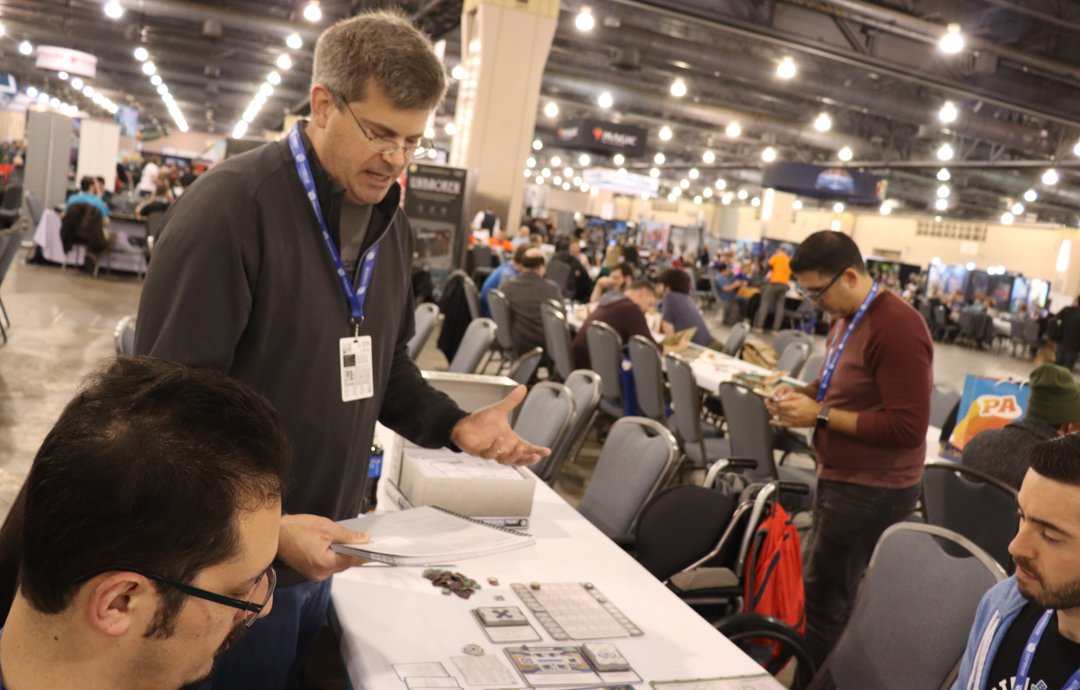
Our playthrough at PAX Unplugged ran smoothly thanks to the fact that Steve ran our game as if he was an RPG gamemaster: reading from the book, helping us with rules, and keeping things moving.
I have to point out this is a very clever design choice for a few reasons. Thematically, it felt very strong, giving us a sense of building tension. Mechanically, it forced each of us to take a die away from solving problems, which meant we had to work smarter and more efficiently. Finally, it meant potentially triggering a lot of crossroads cards at once.
Those of you who are familiar with Dead of Winter know how exciting and dangerous crossroads cards can be: they can be the heralds of last minute supplies or harbringers of surprise problems. Games can be won or lost based on how well one of these card pulls can go. At the same time, the crossroads cards are beloved because of their small story vignettes that they add. Many players suddenly find themselves asking 'what would my character do in this situation?' more than just trying to run the numbers about what choice to make when crossroads cards force you to make a tough choice. I'm happy to say that Gen7's crossroads cards keep this sense of intensity while also being much improved. For one, the crossroads deck is much smaller, kept that way because its built specifically to accomodate whatever characters or events are specifically in the episode you are playing, meaning there are less card pulls where nothing happens. When I asked Steve Nix why you only now pull a crossroads card for the officer, and he said it was to emulate the sci-fi shows of old: that a crossroads event should feel like the moment in a Star Trek episode when a character appears on the bridge, and you know the action is about to begin.
When the operations meeting was called (to save time, when one person places there, everyone can react immediately), this meant a lot of cards were pulled. A few didn't trigger - the player didn't have the right ensign in their barracks - quite a few did. We found ourselves voting on addressing a computer problem directly or trying to let it play out; when we dealt with it directly, the best part of our computer division was filled without us being able to use it for parts. Officer Calvin had to make a tough individual choice, and suddenly her dice pool was used up dealing with the after effects. Officer Farnsworth heard banging from outside the ship; could it be...something on the wing? Eric had to decide if he was wasting time by investigating, or if he was going to stop a real problem. Suddenly, we didn't have a lot of resources or manpower to deal with the standard problems that refill every round.
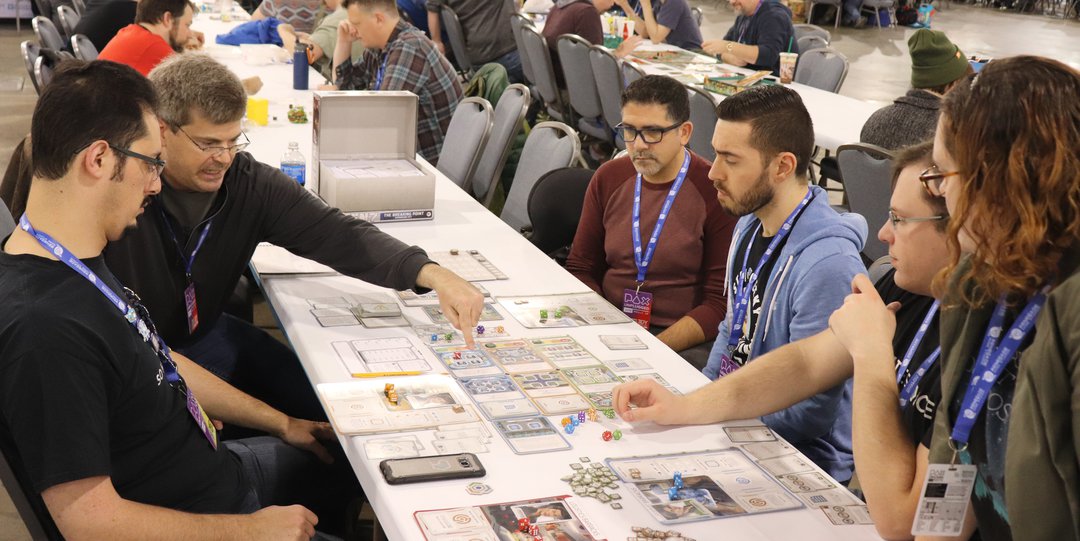
Steve helped us feel better by mentioning we had been very unlucky, as the starting crossroads deck has a good mix of 'boon' and 'bane' cards, and we seemed to be drawing without much luck. The good news here is that once a crossroads card is played out in the campaign, it's gone for that playthrough. Again, Gen7 as a whole has a very strong theme, and many of these design choices were helping with our immersion. By this point we were calling each other by our officer names and pantomiming the bad things happening around us.
We got through the second round, but we had fallen behind. What should have been time spent gathering resources for the next few turns had been stolen from us. This was fine.
Problems Around Every Corner – And Chances At Promotion Too!
This section contains a few additional details about the plot of the first episode. Don't worry: we still don't know if we made the right decision!
Round three is where the game picked up to its real pace of problems: we were given a choice, and it was one that would determine our course of action for the rest of the game. The original problem we had been told about in the first round - a crew member dying by a careless warehouse robot - was bigger than we thought. There was a computer virus that needed to be stomped out, and we could do it by either resetting the software or by manually devoting time and resources to the problem.
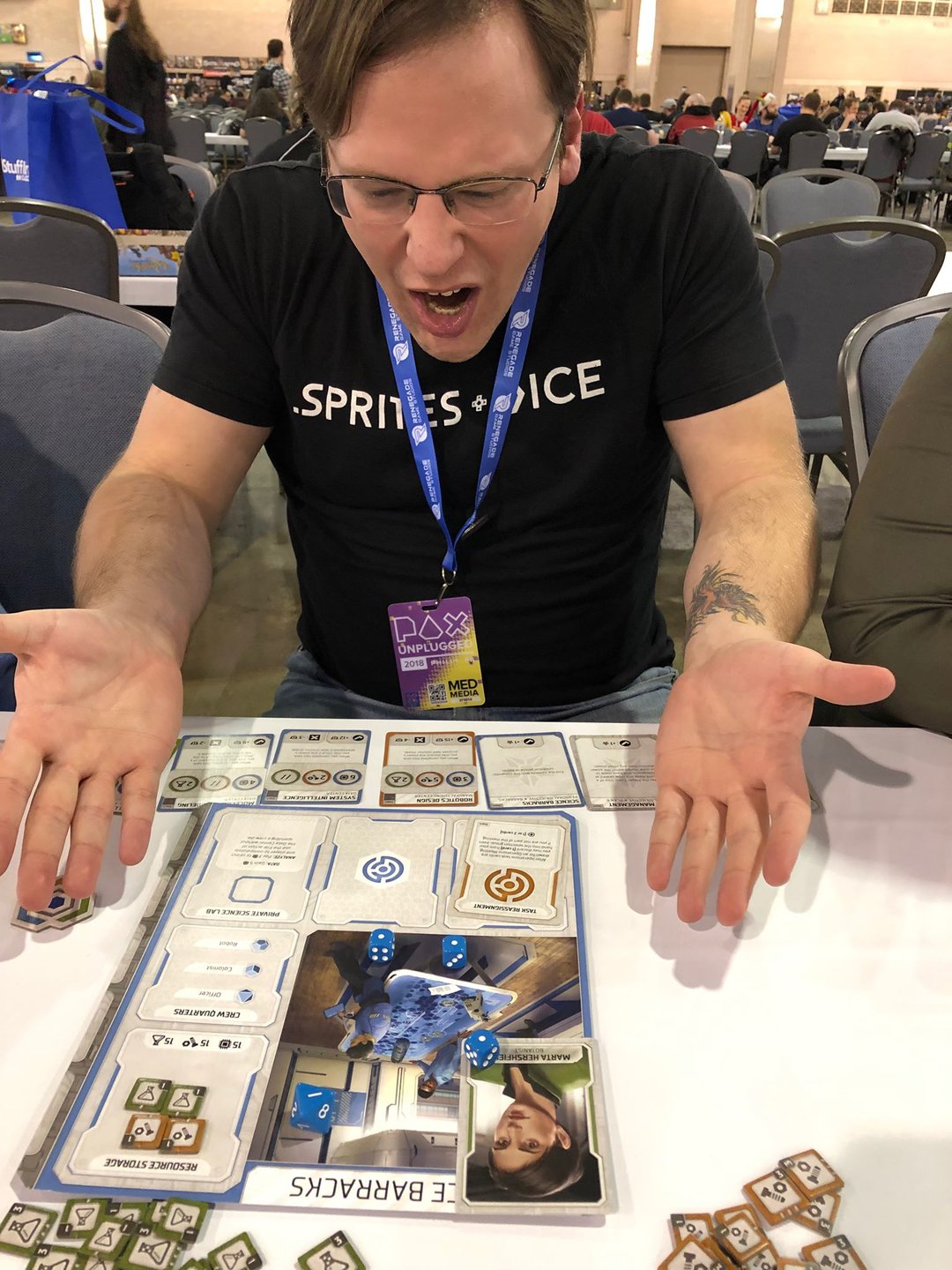
Some rounds of Gen7 just feel like you can't win. When officer Farnsworth keeps rolling all 1's, that doesn't help either.
After a lot of discussion and some persuading words, we all voted unanimously to manually solve the problem. While this choice seemed like it would be more difficult, we decided that letting the issue self-correct might cause more problems in future games. While we weren't going to get to play those campaign games, we had become so invested with Gen7 as a story game we wanted to decide as though the fate of humanity's long term success was in our hands. The logbook was flipped, and we found out that we had to dedicate a ton of computer chips to the data center over the next two rounds or we'd fail. At the same time of course, we found out the amount of crisis cards we had to deal with was going up. Pro-tip: try to get your extra crew members early.
We got to work. The game went from feeling tense but managable to overwhelming. We had two rounds, but that didn't feel like a lot of time when so much was going to go towards solving the new crisis cards. It was time to rally together: each of us made sure the others had enough computer chips to put towards the final objective, while trying to ration out what we needed to do immediately. I got a crossroads card that forced me to lose team members to resolving an unknown problem...which paid off in a free crisis card removal in the final turn. There was a lot of give and take.
The monkey wrench was that the entire team also seemed to realize that we hadn't been handling our personal operations and objectives at the same time. While there is no betrayer (which in my opinion is a huge improvement), you do have tension in how each player is trying to earn merit points each game. Getting twenty-five in a round gives you a merit star: a currency you can turn in between games to get a personal upgrade for later episodes. Getting the highest amount of merit earned you another star too, but hitting fifty merit total gave you the added benefit of gaining rank. And having higher rank meant that your votes counted for more in later games.
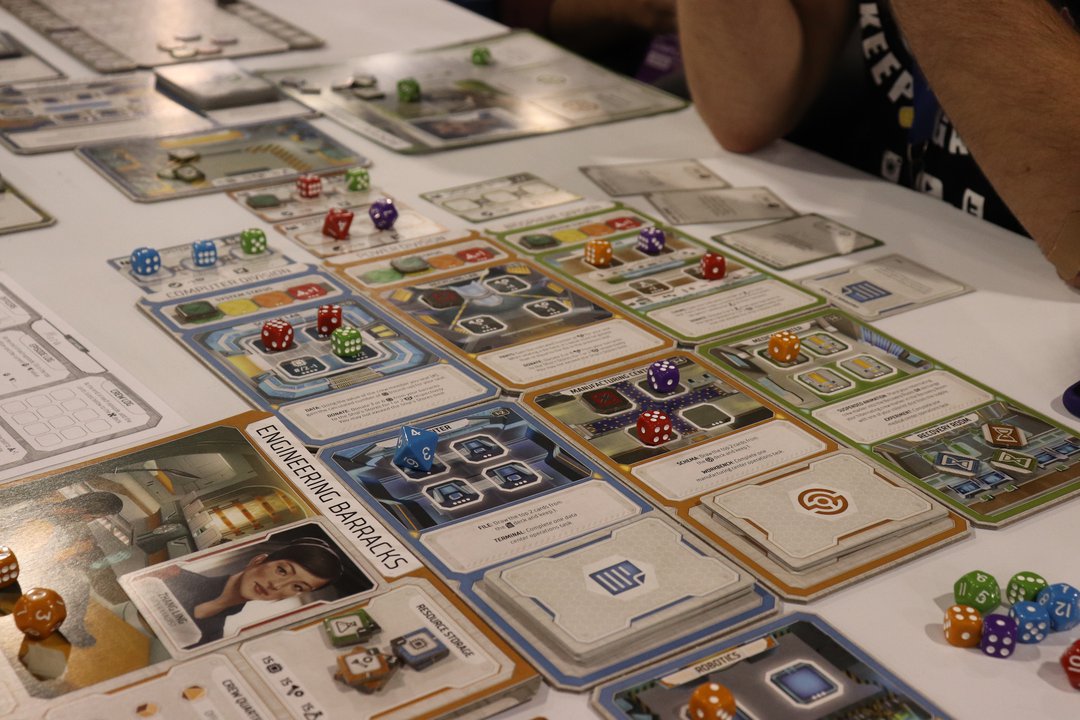
Again, while we all knew that we were only going to play this one game, we had become so enthralled that each of us panicked. Could we beat the objective, stop the crisis, and prove ourselves enough to end up on top? Our personal objectives (which you can complete to get more merit stars) and operations (cards you can acquire to get more merit points) were all public knowledge, so each of us knew what the others were gunning for. Eric and I realized we had taken too many operations cards to fix in just four rounds, and each of them left unfulfilled made you lose merit. Office Kale (Theo) started realizing how well he had played the first few rounds, stockpiling valuable medical supplies that let him earn points by solving problems while many of us still needed to run around collecting more.
Gen7 comes at you in a lot of different ways, and this new source of team tension was more fun than I was expecting.
Damnit Officer Kale, You’ve Saved Us All!
The last round of the game was stressful, but it was mostly because of that strange tension between teamwork and personal merit. We had enough to succeed, but each of us had this nagging feeling that if we didn't spend time getting merit stars, later games would be much, much tougher. Gen7 being a campaign game adds to the theme of being stewards of humanity; your team is playing the long game, always making sure you are prepared for what comes next.
We won, but not before the drama escalated. We decided as a group that it was important we all earned merit stars, so we took time making sure each player could get as many as possible. Unfortunately, this meant we almost missed the main objective before some brilliant use of data cards to ramp up our computer chip supply. We let the power station take a little superficial damage on the last round, but it was a gamble that paid off. The last few turns around the table became a race to the top, but our dear Theo was dancing in his chair as it became clear we weren't going to take away his place as the star officer. Still, we had gotten through the first episode without any true catastrophe, and each of us was ending with a handful of merit stars.
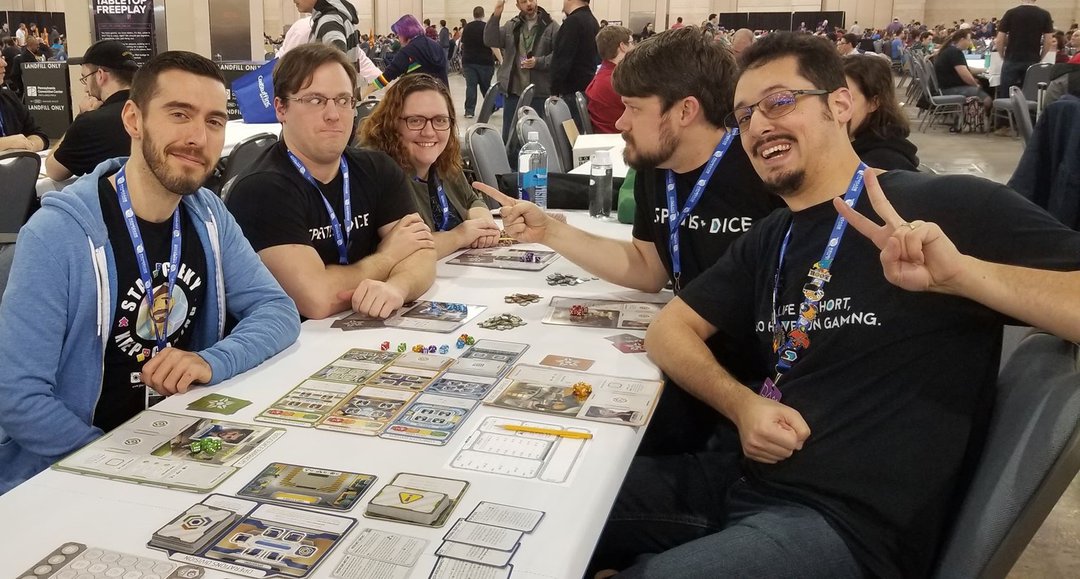
Working as a team is easy... you can still be mad at Eric for rolling terribly though.
Steve congratulated us for doing well for our first attempt, and that we had balanced the personal achievements against the group goal very well. We did get read the results of our choices, which caused us all to wince quite a bit. Without giving away any of the story points, it was revealed to us that if we had gone onto game #2, it would start at a much faster pace with some real objectives out the gate. It was also revealed to us that a new type of problem would be in the game from this point on as well. We had just gotten started in our long journey towards humanity's new home.
Some Notes For The Captains Log
If you haven't been able to guess by this point, I absolutely love Gen7. I've made it clear in other articles that as long as a game gives you compelling story, I can forgive a lot of design issues or shaky mechanisms, and Gen7 gives you a compelling story hands down. Even better is that you don't have to worry about shaky mechanisms while you are playing: it's a joy to play. This is obviously the spiritual sequel to Dead of Winter, and it took many design lessons from that orignal 2014 release. It built on the great tension that zombie survival game had, while also tidying up a lot of what didn't seem to work. Some of the tasks in Dead of Winter felt like chores you had to survive to get to the payoff, but Gen7 deals out rewards or consequences with any die you put on the table, keeping up excitement.
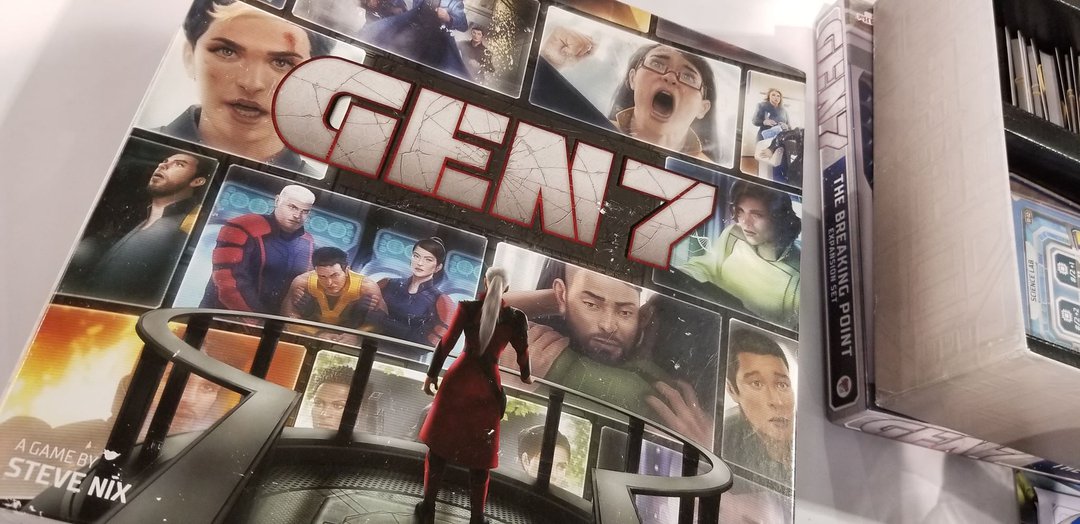
When I first heard that Gen7 was going to have personal objectives, I got a little disheartened, I'll admit. I didn't like the betrayer mechanic of Dead of Winter, and I wanted to get away from that added weight that felt like it distracted from the collective teamwork. I was pleasantly surprised when the merit system felt good! Fantastic even, because it meant each turn you were always weighing your options. Each time you get to place a die, you are negotiating how much you can earn while also making sure the ship as a whole succeeds.
I should be quick to point out that our game of this was easier than some other survival co-operative games that exist out there. At the same time, we were only in round one of seven. How much harder could the game get? What would happen as we started acquiring permanant upgrades to our characters? How much higher would the tension build?
All I can say is that based on this first episode, Gen7 is a fantastic game at first look, and that I am already committed to finding out more about the story.
But Will The Game Be Worth It?
When we first sat down to play, I fully admit that I hurled an unfair question at our host. "I have high hopes for this game," I began as Steve continued to unload the giant game box. "and so do many others. But many people are asking: is it really worth a hundred dollars?"
This is the chief criticism of Gen7 at this point. There's a lot of buzz and anticipation as Plaid Hat Games releases Gen7 as while I wrap up this article, and many believe the game will live up to the reputation that crossroads games have acquired. However, $100 is a lot of money to drop on a board game, and many have critiqued that maybe the game is asking for too much for what's inside the box.
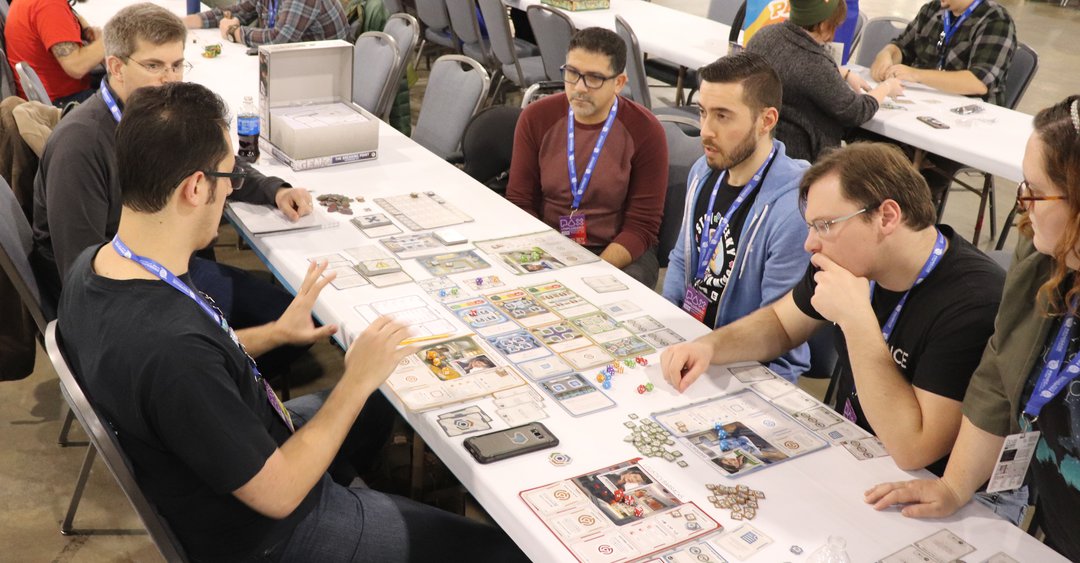
We needed a big table for this game, both for all the components, and also to gesture wildly to get our points across.
I'll be blunt: it's not. Gen7 has beautiful components, and while maybe there are less components in the box than a similarly priced miniatures game, I find myself not caring. The fantastic spiral-bound logbook is a treasure trove that you'll be able to dig through over many games. The campaign is something you beat, but there's a choose your own adventure vibe to the whole experience. I know for a fact that after I finish a full game, I'd be more than willing to play another campaign just to make different choices to see what would happen. We were able to play with five players because of the added expansion The Breaking Point, but that box also comes with new ways to play in alternative fashions, such as single-shot scenarios.
There's a lot here to this game, and I'm not even sure I've gotten to the real meat of what's in store for you if you decide to pick up a copy. Will it be worth it? If you love sci-fi and you love stories, I would unequivocially say yes. Adam's already picked up a copy for us to start playing soon, and Antonella said she's interested in finding a group near her home.
Good luck officer: the fate of humanity might soon rest in your hands.